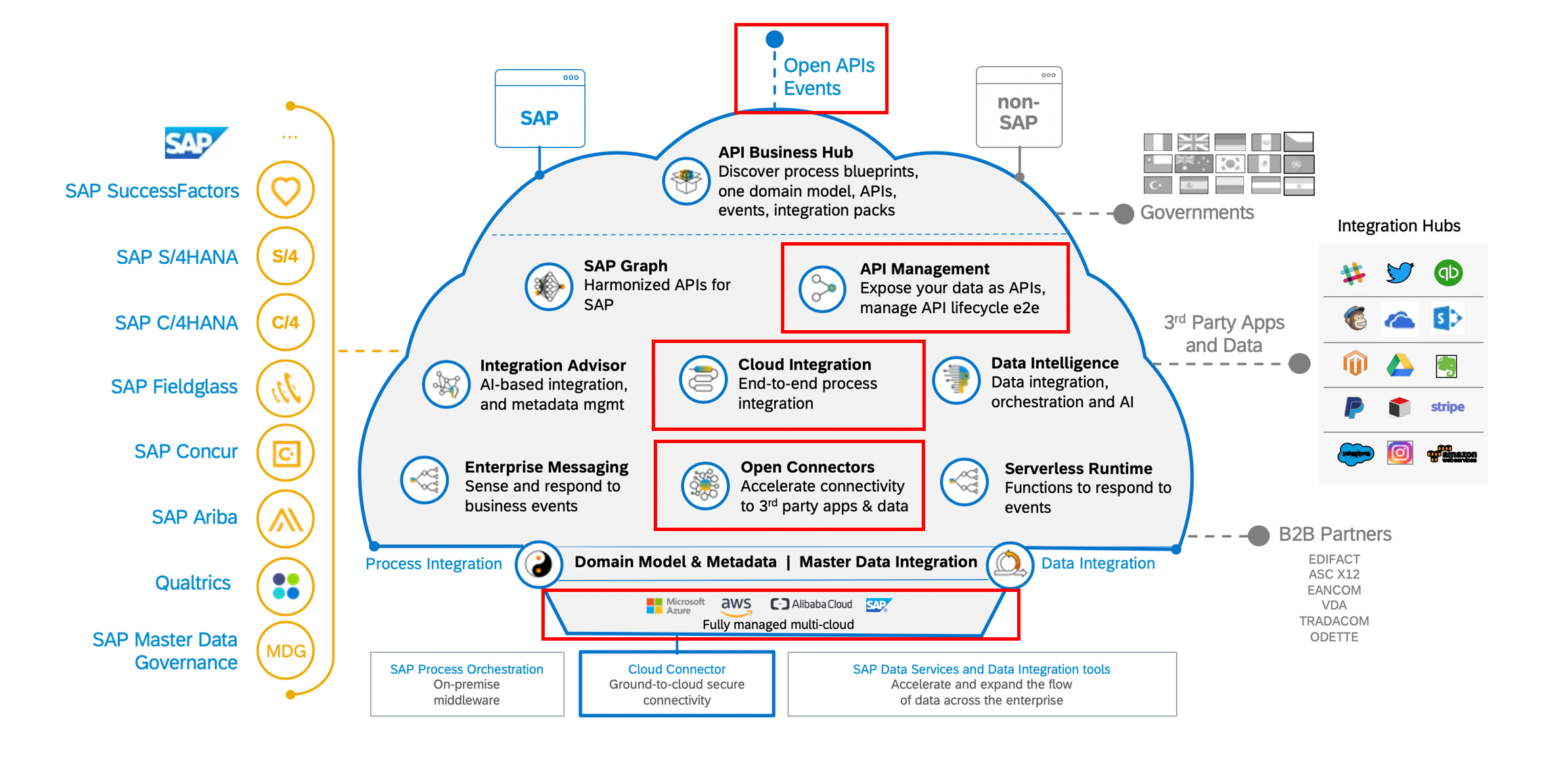
Are you currently looking for a follow-up platform for SAP Process Integration & Process Orchestration (PI/PO) that allows you to migrate existing system integrations easily and with the help of tools? Are you looking for a solution to connect your system landscape via central middleware? Or do you focus more on expanding, for example, API functionality? Then the SAP Integration Suite is definitely worth a look.
What is the SAP Integration Suite?
The SAP Integration Suite is an Integration Platform as a Service (iPaaS) and a central pillar in the service offering of the SAP Business Technology Platform (BTP). It supports the rapid integration of on-premise and cloud-based processes, services, applications, events and data. By providing preconfigured content and tools, the Integration Suite can help accelerate processes and innovations and thus value creation.
(What: SAP)
What advantages does the SAP Integration Suite offer?
With the help of the SAP Integration Suite, business processes can be flexibly implemented on a large scale with API-led integration, systematically integrated across a wide range of system and application landscapes and optimized with developments and recommendations integrated into tools.
Applications and systems from different manufacturers can be centrally connected. Functions from SAP, partners and specially developed resources are available for this purpose.
What are key features of the SAP Integration Suite?
The following overview shows the modules currently included in the Integration Suite. Below we will look at the currently most important ones and briefly introduce them.

(What: SAP)
-
- Cloud Integration: With this module, integration points can be quickly and easily designed and developed in the cloud, on-premise and in hybrid landscapes for application-to-application (A2A), business-to-business (B2B) and business-to-government (B2G) scenarios and managed. Message mapping recommendations are used on a crowdsourcing basis. The module simplifies integration between SAP and third-party applications and data sources. In addition, the cloud integration makes it possible to migrate from older on-premise integration tools such as SAP Process Orchestration.
-
- API Management:With API Management, companies create designs based on open standards – including OData and the OpenAPI specification. The module allows you to modify and extend the preconfigured SAP data model with SAP Graph to connect to SAP and third-party systems and increase developer productivity. Innovation is accelerated by releasing APIs that are intuitive and easy to manage. APIs are protected from security threats with over 40 built-in policies. In addition, data traffic can be managed and data can be stored in the cache of the network peripherals.
-
- Open Connectors: Easily connect to more than 170 apps and third-party solutions in collaboration, messaging, CRM, help desk, and more.
-
- Event Mesh: With a fully managed cloud service that supports event-driven architectures, applications can communicate asynchronously and in real time across distributed landscapes. Event Mesh enables the use of scalable, event-driven process integration patterns and helps manage peak loads in various environments.
-
- Safe operation: All servers for the SAP Integration Suite are operated by SAP in dedicated data centers that comply with current security standards and meet both the ISO27001 standard and the data protection requirements according to EU standards. You can also use other security features – such as encrypting stored data, authentication procedures based on certificates and the use of digital signatures.
Introduction options
SAP Cloud Integration can be used as a central integration platform, as middleware to connect on-premise systems and cloud systems, or as a connection between cloud systems. Topics such as strategy, licenses, tools and data security should not be ignored and should be carefully tailored to the requirements, as the large selection can quickly lead to confusion.
If an SAP PI/PO is already in use in the company, the logical consequence is to replace it with the SAP Integration Suite in a future-proof manner.
Conclusion
Regardless of whether you are already using the SAP Integration Suite and want to activate additional modules, specifically want to add additional functionalities in a module – for example cloud integration – or whether you want to introduce the SAP Integration Suite into your company:
CONET will be happy to support you with the introduction and expansion of the SAP Integration Suite!
We advise you and design the best integration scenario together with you and implement it together with you. Even if you want to try out and pilot the service, we are happy to help you build a proof of concept. We also train your employees if necessary.
Get more information
Source: https://www.conet.de/blog/sap-integration-suite/



